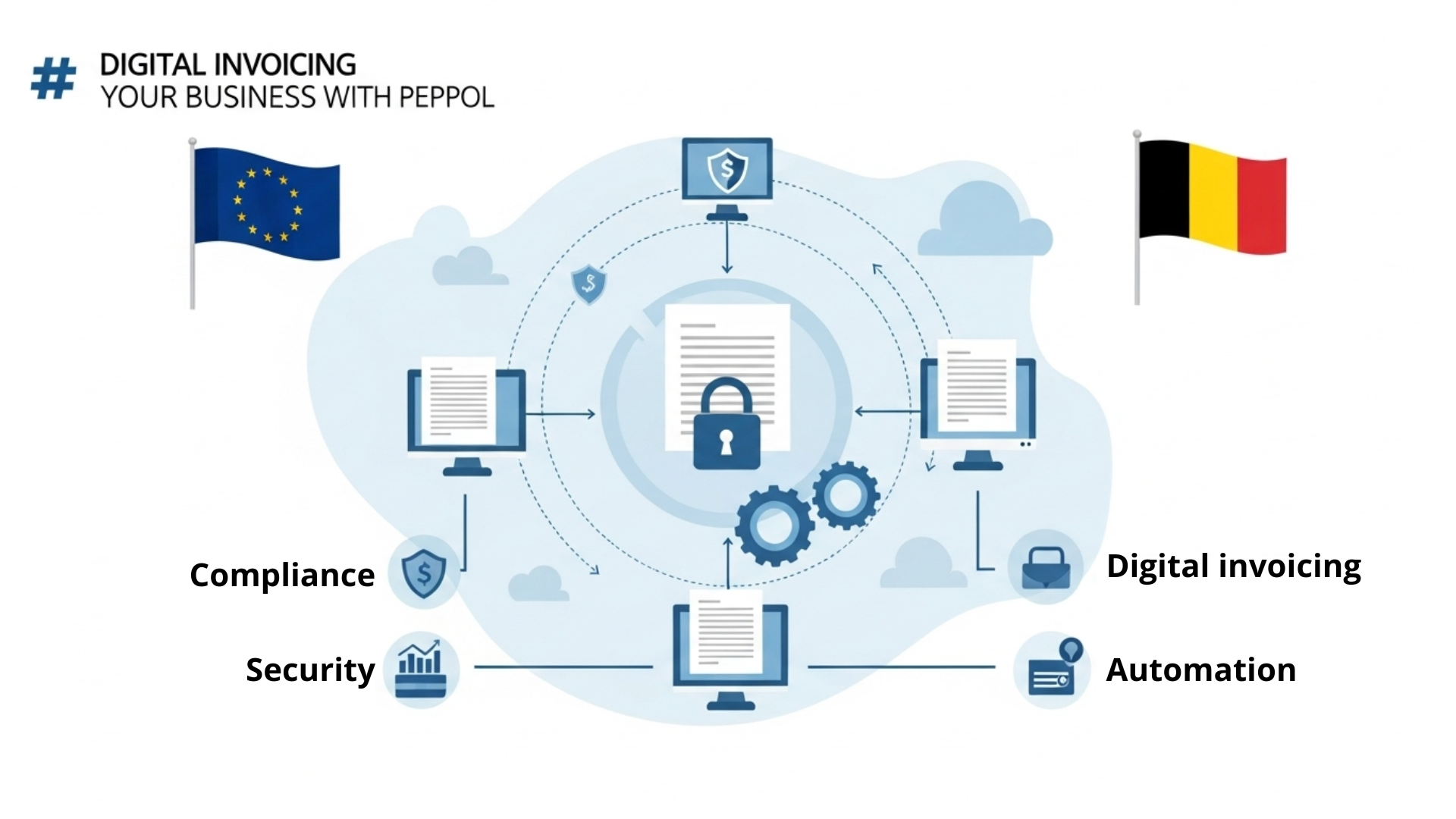Why a PDF is not an electronic invoice

E-invoicing in Belgium starting January 2026
For a long time, many companies in Belgium believed that sending a PDF by email was the same as issuing an electronic invoice. This idea, still widely spread, is incorrect – especially under the new EU and Belgian requirements effective January 1, 2026. The invoicing landscape is changing quickly, and this shift will directly affect all businesses, regardless of size.
Why a PDF sent by email will no longer be enough in 2026
A PDF is convenient for human reading, but it does not legally qualify as an e-invoice. Technically, it is a visual document that does not allow automated processing.
In practice, this means:
Accounting software cannot automatically extract data from a PDF. Each amount, reference, date, or VAT number must be entered manually, which increases the risk of errors and raises administrative costs. Moreover, the lack of structured data makes reliable automation impossible.
As of January 1, 2026, in Belgium and for all B2B transactions (incoming and outgoing invoices), a PDF sent by email will no longer be considered a valid e-invoice. Businesses may still attach it as an informative copy, but it will not meet the legal requirements imposed by EU and Belgian law. This marks a clear break from current practices.
What is a true electronic invoice?
Unlike a PDF, a genuine electronic invoice is a structured document that complies with specific European standards. It must:
- Be issued and received in a standardized format (e.g., Peppol-BIS, based on EN 16931).
- Be automatically transmitted between companies’ accounting systems, without manual intervention.
- Be sent via a secure network such as PEPPOL, which ensures the authenticity and integrity of the data.
A true e-invoice is not just a file – it is a structured data flow that integrates directly into accounting software, serving both legal and technological functions.
Why is this change necessary?
Belgium’s adoption of e-invoicing is part of a broader European strategy to modernize and secure business exchanges. Key objectives include:
Fighting VAT fraud: Stronger traceability and better information sharing help tax authorities reduce losses.
Automating accounting processes: Companies save valuable time by reducing manual entry and error correction.
Modernizing administration: E-invoicing promotes digitalization and improves the competitiveness of SMEs.
Reducing costs: Less paper, less manual work, greater efficiency.
The role of PEPPOL in e-invoicing
The PEPPOL network (Pan-European Public Procurement Online) is the preferred solution for exchanging e-invoices in Belgium and across Europe. It allows businesses and administrations to communicate over a shared, secure infrastructure. Each participant is identified and certified, ensuring that invoices sent and received are authentic and intact.
For Belgian companies, issuing and receiving invoices via PEPPOL will become the norm starting in 2026. Many providers, including Hit-Online, already support SMEs in this transition.
The benefits for Belgian businesses
Implementing e-invoicing is an opportunity for simplification and modernization. For Belgian SMEs, often burdened with heavy administrative tasks, automation is a huge advantage:
- Faster processing of incoming and outgoing invoices
- Fewer data entry errors
- Better visibility over cash flow and finances
- Guaranteed compliance with new legal requirements
Rather than seeing this as a constraint, businesses should view it as a lever for efficiency and innovation.
The legal framework in Belgium
Belgian law is aligned with the EU directive that requires mandatory e-invoicing for business-to-business transactions. The government has foreseen a transition period, but the deadline of January 1, 2026 is firm: From this date, every Belgian business must be able to issue and receive compliant e-invoices.
The Royal Decree of July 14, 2025
A major milestone in this process is the Royal Decree of July 14, 2025, which defines the practical details of the obligation. According to Article 3, all Belgian companies must adopt a structured, EU-compliant format and use a secure network such as PEPPOL.
The decree does more than set obligations: it also establishes consequences for non-compliance. Invoices in PDF or non-structured formats may be rejected by recipients or deemed legally invalid. This could lead to payment delays, commercial disputes, or tax penalties.
It is therefore essential for every business to update its processes before the deadline. Anticipation is the best protection against risks and ensures a smooth transition.
How Hit-Online makes e-invoicing easy
To support businesses in this transition, our solution Hit-Online provides a clear, intuitive interface. You can create, send, and receive electronic invoices in a fully automated and compliant way, in line with Belgian and European standards.
You can create your account for free and test Hit-Online for 2 months with no commitment, or contact us directly at commercial@ficos.com.
Conclusion
Sending PDFs by email is a thing of the past. From 2026, legally valid e-invoicing will be mandatory for all companies in Belgium. It is crucial to understand this change and prepare now.
Early adopters will benefit from simplified management, improved productivity, and full legal compliance. The shift is unavoidable – but it also represents an opportunity for long-term efficiency and competitiveness across the Belgian economy.

Enjoy 2 free months to test e-invoicing with Hit-Online and discover its full potential for your construction business.
Make your construction company future-ready
Trust Hit-Online, the software made by construction professionals for construction professionals.
Get Free Demo